汉英对比动态与静态
英汉静态与动态对比

In terms of economic strength India is far behind.
英语在表示方位或状态的时经常使用out﹑on﹑ over﹑ off ﹑back﹑ up ﹑apart 等副词,而汉语在表示这些状态时往往会 使用动词。所以,汉语一些表示方向或方位的状态动词要转译为 英语的副词。例: 这两个工厂相隔两公里。
(一)动词转换成名词
汉语中动词占优势,英语中名词占优势。一个主要原因就 是汉语中缺少像英语中的“-ing”词尾和抽象名词的词 缀那样的抽象化手段,
1.他妹妹老是说谎。 His sister is a great liar. 2.他瞟了一眼钟。 He cast a glance at the clock. 3.这所大学造就了他。 The university was the making of him.
(三)动词转换成副词
由于介词大多数都有与之同形的副词,这些副词和介词同样活跃有 用,也可以表达汉语中常用动词来表达的概念,因此汉语动词也可转 换成英语中与介词同形的副词。 1.我明天早上动身。
I am off tomorrow morning. 2.桌布铺上了吗? Is the cloth on? 3.就经济力量而言,印度落后很远。
He is a good eater and a good sleeper. 他能吃能睡。
试比较:
You are a terrible liar.
你谎话说得太差劲.
His very appearance at any affair proclaims it a triumph
无论什么事情,只要他一露面,就算是成功了。 He admires the President’s stated decision to fight for the job.
英汉动态与静态的差异与词性转化

二﹑英译汉时静态向动态的转换
例 10: Other investigators with a depth-psychological orientation emphasize the similarities between the fantastic events in myths and fairy tales and those in adult dreams and daydreams—the fulfillment of wishes, the winning out over all competitors, the desrtuction of enemies—and conclude that one attraction of this literature is expression of than which is normally prevented from coming to awareness.
二﹑英译汉时静态向动态的转换
例 9: An increase in the December 2006 passenger volume by 13.3 percent versus the same month last year meant that the total for the full year ( 19.2 million passengers) was 7.6 percent higher than in 2005. 2006年12月的旅客人数较前一年同期增加了 13.3%。 这说明全年的旅客总数(1920万人) 较2005年增加了7.6%。
一﹑英汉动态与静态的差异概述
英语中还使用动词表示方向或方位,所以 一些表示表示方向或方位的英语副词对应 的汉语却是动词,如:over ﹑down ﹑up ﹑ in ﹑ out ﹑away ﹑off等对应的汉语是“结 束” ﹑“下来” ﹑“上去” ﹑“在家” ﹑“出去” ﹑“离开” ﹑“出发”等。
汉英语言对比 第六讲 静态与动态
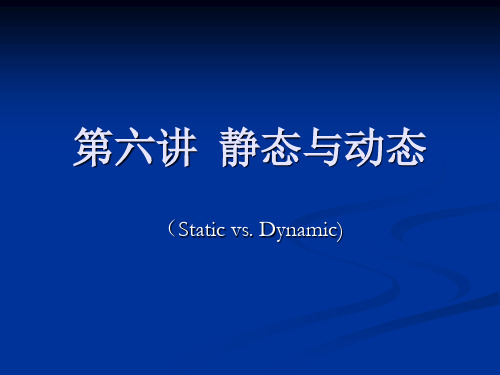
(Static vs. Dynamic)
概述
英语呈静态, 英语呈静态,汉语呈动态。 语言发展中的简化倾向(tendency simplification) 语言发展中的简化倾向(tendency of simplification) 是直接动因(motivation) 是直接动因(motivation)
从几个标语说开去
禁止通行:No 禁止通行:No Thoroughfare 禁止停车: No Parking 禁止超车: No Passing 禁止掉头: No U-turn U闲人免进:No 闲人免进:No Admittance Except on Business 不准在此设摊兜售:No 不准在此设摊兜售:No Hawker 包您满意,否则退款:Satisfaction 包您满意,否则退款:Satisfaction or your money back. 保证三个月内免费维修:Full 保证三个月内免费维修:Full three months unconditional service guaranteed 立正!” 立正!”: Attention! “向左/右/后转!”: Left / Right / About Turn! 向左/ 后转!” “齐步走!”:Quick march!(这里的march是名词,如果是动词则可表达为 齐步走!” march!(这里的march是名词,如果是动词则可表达为 march quickly!) quickly!) “跑步走!”:Double March!/At the double, quick march! 跑步走!” “稍息!”:At ease! 稍息!” 您先请!After 您先请!After you, please! 未满十八岁者勿进:For 未满十八岁者勿进:For Persons over 18 Years of Age 未经许可,车辆不得入内:Authorized Cars only 未经许可,车辆不得入内:Authorized
英汉对比静态与动态

5.静态-ADJ&ADV.IN PLACE OF VERBS
❖使用动词的同源形容词与弱化动词相结合的方式表达动词的意义
英汉语言对比 静态与动态
英语—静OR动?
1. Admittance Free 免票入场
2. Out of Bounds 游客止步
3. No Admittance Except on Business 闲人免进
4. Danger of Death – High Voltage! 高压危险!
英语-静态STATIVE
3.静态-PREPARATION- PROMINENT
❖ 英语常用介词短语代替动词短语,即“以静代动”
1)他们立刻出动去追击敌人。 They immediately set out in pursuit of the enemy. 2)有人给他撑腰。 He has someone behind him. 3)他在读书。 He is at his books. 4)机器正在运行。 The machine is in operation 5) 说完这些话,她便走开了。 With these words, she went away.
4.静态- VERB- WEAKEN
❖动词虚化: 把动词转化或派生成名词,置于虚化动词(have, make, take, do)之后做其宾语,如have a look, take a walk, make attempts, pay visits, do some damages, put up a proposal
英汉对比研究 静态与动态

一算 试了一试 A着A着(A了A了):看着看着 走着走着 老了老
•
了 完了完了 AABB式:说说笑笑 来来往往 吃吃喝喝 摇摇
•
晃晃 吵吵闹闹 ABAB式:讨论讨论 学习学习 休息休息 热闹
•
热闹 走动走动 ABAC式:无依无靠 有始有终 任劳任怨 没完
•
没了 敢作敢为
汉语还有大量对偶复意的动词词组,如:
静态与动态 禅茶一味 道在其中 Static vs.Dynamic
走开! Stay away! 别管我! Leave me alone! 他吃素,不吃荤 He is a vegetarian.
她们飞上了蓝天(报纸标题) Women Pilots in China 周阿斗寻父记(文章标题) A Reunion of Father and Son 你老是看钟等着下课啊! Oh! You're a clock-watcher!
佛罗里达东海岸有一场热带风暴。
A tropical storm lashed the east coast of Florida.
一场热带风暴袭击了佛罗里达东海岸。
It was the finding of the committee that
there had been bribes paid by company manager
He is at his books.(=He is reading books)
He has someone behind him. (=Someone supports him)
The machine is in operartion. (=The machine is working.)
Is this train for Chicago? (=Is this train going to Chicago?)
英汉静态与动态对比

英语中,名词化是一种常见的语言现象
英语名词化简单说来即英语偏重使用名词,即所谓“名词 优势于动词”(preponderance of nouns over verbs) 。 英语趋向于用名词来表达原来属于动词 (或形容词) 所表 达的概念。
She succeeded in this match , so she felt encouraged (这次比赛她获胜了,因而很受鼓舞) . 从英语修辞效果上看,它更多是用以下简单句结 构表达: Her success in this match served as great encouragement to her.
他对总统声明为保持其职位而决心奋斗表示钦佩。
英汉对比之静态与动态(Static vs Dynamic)
在汉语里,动词使用频率高,呈现一种动态特征。 而在英语里,名词和介词使用频率高,呈现一种静态。
从语法上看, 英语句子是以动词为中心的。但动词的 使用频率明显低于汉语句子。周志培对三个翻译材料 (邓小平《在武昌、深圳、珠海、上海等地的谈话要 点》及英译文、英国首相撒切尔夫人在中国欢迎宴会 上的讲话及汉译文、美国罗斯福总统第四任就职演说 及汉译文) 进行分析,得出结论: 英语动词在这三个 材料中所占比率分别为14 %、11 %和15 % , 而汉语 动词所占的比率为则33 %、24 %和25 %。
In terms of economic strength India is far behind.
英语在表示方位或状态的时经常使用out﹑on﹑ over﹑ off ﹑back﹑ up ﹑apart 等副词,而汉语在表示这些状态时往往会 使用动词。所以,汉语一些表示方向或方位的状态动词要转译为 英语的副词。例: 这两个工厂相隔两公里。
汉英静态与动态比较

A tropical storm lashed the east coast of Florida. 一场热带风暴袭击了佛罗里达东海岸。 除了be之外,have, become,grow, feel, go, come, get, do等也是英语常用的弱式动词
4. 名词优势造成介词优势
介词前置于名词或名词性短语,由于英语多用名词,必然也要多用介词,所以产生了介词 优势。介词优势和名词优势的结合,使英语的静态倾向更为显著。
英语常用介词短语取代动词短语,即以“静”代“动” 如: He is at his books.(He is reading books.)
英语里表示心理或心理感觉的形容词以及其他形容词也常常与弱式动词构成系表结构,表 达相当于动词的意义。
A postman is not afraid of dogs. He was unawwre of my presence. John seems content just to sit in front of the television all night.
说是的说是,说非的说非,莫衷一是。 Some say "yes"and others "no"; I don't know whom to follow.
学问,学问,要学要问;边学边问,才有学问。 Acquisition of knowledge entails learning and seeking for explanation.
“名词+介词”的优势常见于英语里大量的弱式短语。这类短语往往削弱或淡化(dilute)原来 所要表达的动词、形容词和其他词语的意义,使叙述曲折迂回(circumlocution),所以增 强了静态感
英汉对比研究-静态与动态

静态与动态 Static vs. Dynamic
What is metaphor? any figurative expression:the transferred sense of a physical word; (词义的转移,如用 “诞生”表示任何事物的起源) the personification of an abstraction;(抽象行为的拟人化,如 “modesty forbids me”的意思是“由于谦虚,我不能”) the applicaton of a word or collocation to what it does not literally denote, i.e., to describe one thing in terms of another.( 用一个单词 或语句表示字面意思之外的意思,如用“cold blood”表示“without feeling or pi purpose of metaphor is basically twofold: referential purpose is to describe a mental process or state, a concept, a person, an object, a quality or an action more comprehensively and concisely than is possible in literal or physical language; pragmatic purpose is to appeal to the senses, to interest, to clarify 'graphically', to please, to delight, to surprise.
英汉静态与动态对比

5.动词的弱化与虚化
英语里最常用又最有用的动词正是 动作意味最弱的动词--be,其八种形 式 (be,am,is,are,was,were,being,be en) 都缺乏动态感由 it 或 there 与 be 构成的句式,其静态意味更加明显。
There was a tropical storm off the east coast of Florida?
“名词 + 介词”的优势常见于英语里 大量的弱势短语:
come into conflict with = conflict
arrive at a decision =decide
of a kindly nature =kind
beyong the shadow of a doubt =certain due to the fact that=because
但名词化现象大大增加了读者理解的 难度。
Our son has been a disappointment to us. 我们的儿子令我们失望。 The sight of the books sends my memory back three years ago. 见了这些书,我想起三年前的往事。
汉语动词可以充当助动词,置于主要 动词的前后,形成动词连用。前置助 动词(能愿动词)主要有:要、会、 能、想、可能等;后置助动词(趋向动 词)主要有:来、去、起来、下去、 等。 He has come (gone) to borrow books.他来(去)借书 他借书来(去)了。
他来(去)借书来(去)了。
英汉动态与静态的差异与词性转化
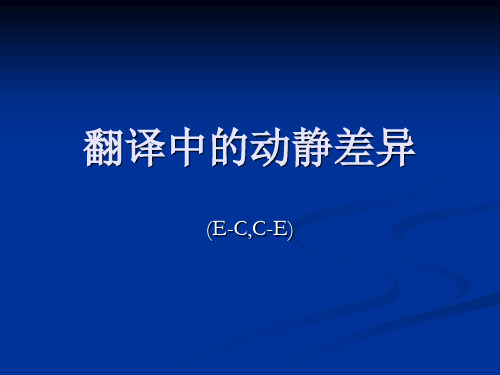
例 4: The Act allotted public land to each state for establishment of agricultural and industrial colleges.
该法案为各州划拨土地,用来建立工农业 学院。
二﹑英译汉时静态向动态的转换
二﹑英译汉时静态向动态的转换
例 9: An increase in the December 2006 passenger volume by 13.3 percent versus the same month last year meant that the total for the full year ( 19.2 million passengers) was 7.6 percent higher than in 2005. 2006年12月的旅客人数较前一年同期增加了 13.3%。 这说明全年的旅客总数(1920万人) 较2005年增加了7.6%。
二﹑英译汉时静态向动态的转换
例 10: Other investigators with a depth-psychological orientation emphasize the similarities between the fantastic events in myths and fairy tales and those in adult dreams and daydreams—the fulfillment of wishes, the winning out over all competitors, the desrtuction of enemies—and conclude that one attraction of this literature is expression of than which is normally prevented from coming to awareness.
英汉语言对比静态与动态-精品文档
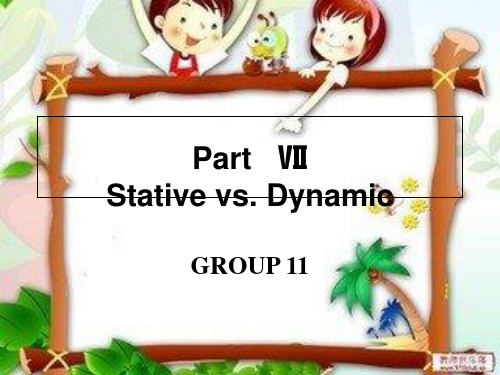
• Our son has been a disappointment to us.
2. To use Agentive Nouns in place of Verbs 用名词表示施事者,以代替动词 他妹妹老是说谎。 His sister always lies. His sister is a great liar.
(2)名词+介词的优势常见于英语里大量的弱式短语。 •give rise to (arouse) •make contact with (meet) •arrive at a decision (decide) •bring to a conclusion (finish) •undertake a study of ( study) •take into consideration ( consider) •afford an opportunity to (allow)
(They immediately set out to pursue the enemy.)
有人给他撑腰。
He has someone behind him.
(Someone supports him.)
他在读书。 He is at his books. (He is reading books.)
4. Verb- weaken动词的弱化与虚化 (1) 英语里最常用的动词正是动作意味最弱的动词----to be,其各种形式包括must be, maybe, should have been都缺乏动态感,由it或there与be构成的句式,其静 态意味更加明显: • 山脚有一栋大别墅。 • There is a big villa at the foot of the hill.
英汉静态与动态对比

5.动词的弱化与虚化
英语里最常用又最有用的动词正是 动作意味最弱的动词--be,其八种形 式 (be,am,is,are,was,were,being,be en) 都缺乏动态感由 it 或 there 与 be 构成的句式,其静态意味更加明显。
There was a tropical storm off the east coast of Florida?
=Is this train going to Chicago?
这趟火车是开往芝加哥的吗?
介词与名词结合,组成介词短语。成 串的介词短语又常常与弱化动词 (be,seem,look等)和“乏味的名词” (ponderous nouns)连用: In view of the fact that Mr.Jones is not very well, i am taking the opportunity of replying on hia behalf.
约翰整夜坐在电视机前似乎就满足了。
(副词)英语还常用副词来表达动词 的意义,如:
I am afarid Mr.Brown is out,but he will be in soon. 恐怕布朗先生出去了,但是他很快会 回来的。
He will be home in half an hour. 他将在半小时内到家。 Down with the old and up with the new.破旧立新。Over!!!
汉语动词可以充当助动词,置于主要 动词的前后,形成动词连用。前置助 动词(能愿动词)主要有:要、会、 能、想、可能等;后置助动词(趋向动 词)主要有:来、去、起来、下去、 等。 He has come (gone) to borrow books.他来(去)借书 他借书来(去)了。
英汉语言对比静态与动态

• (2)"noun+preparation" • 名词+介词的优势常见于英语里大量的弱式短语。
(1) Preparation phrases in place of verb phrases 他们立刻出动去追击敌人。
They immediately set out in pursuit of the enemy.
• A big villa locates at the foot of the hill.
(2) 英语还常把动词转化或派生成名词,置于虚化动 词(have, make, take, do)之后做其宾语,如have a look, take a walk, make attempts, pay visits, do some damages, put up a proposal等。这类动词短语显得虚 弱而平淡无味。如:
• 我们的儿子令我们失望。 • Our son has disappointed us.
• Our son has been a disappointment to us.
2. To use Agentive Nouns in place of Verbs 用名词表示施事者,以代替动词 他妹妹老是说谎。 His sister always lies. His sister is a great liar.
他和老板吵架之后就辞职了。
After he had a quarrel with his boss,he quit.
After he quarreled with his boss,he quit.
• 5. Ajectives and Adverbs in place of Verbs • (1)英语常用动词的同源形容词与弱化动词相结 合的方式表达动词的意义。 • 她在睡觉。 • She is asleep.(She is sleeping.)
汉英语言对比+第六讲+静态与动态
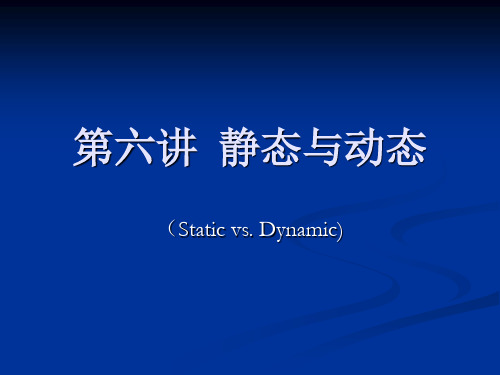
实现理想需要靠辛勤劳动。 To translate ideals into reality needs hard work. 解决问题的最好办法是进行调查研究。 The best way to solve the problem is to conduct investigation 他们喜欢乘火车旅行。 The enjoy traveling by train. 革命不是请客吃饭。 Revolution is not a dinner party.
1.名词化(nominalization)倾向 (tendency)是英语的特征之一
Preponderance of nouns over verbs. (S. Potter)
The doctor arrived extremely quickly and examined the patient uncommonly carefully; the result was that he recovered very speedily. The doctor’s extremely quick arrival and uncommonly careful examination of the patient brought about his very speedy recovery.
7.动词连用是汉语的常态(normal)
他想办法摆脱困境。 你去教室把他叫回来。 我把他请来打字。 我被老师叫到办公室去做检讨。 我去叫他们派一个会计到这儿来帮你们算帐吧。
汉语是动感强烈的语言 一个句子中的定式动词 (finitive verbs)在数量上并无限制
8.动词可以充当汉语的任何句子成份
《英汉对比研究》第7章 静态与动态
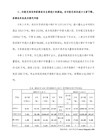
第七章静态与动态(Stative vs.Dynamic)英语倾向于多用名词,因而叙述呈静态(stative);汉语倾向于多用动词,因而叙述呈动态(dynamic)。
R.Quirk等人对静态和动态曾作如下解释:Broadly speaking, nouns can be characterized naturally as ‘stative’in that they refer to entities that are regarded as stable.whether these are concrete (physical) like house,table,paper,or abstract (of the mind)like hope,botany,length.At the opposite pole,verbs can be equally naturally characterized as ‘dynamic’:they are fitted (by their capacity to show tense and aspect,for example) to indicate action,activity and temporary or changing conditions.These relations between the open classes can be summarized thus:STA TIVE noun ↔ adjectiveDYNAMIC verb adverb英语的静态倾向,主要表现在以下几方面:一、名词化(Nominalization)是英语常见的现象。
名词化主要指用名词来表达原来属于动词(或形容词)所表达的概念,如用抽象名词来表达动作、行为、变化、状态、品质、情感等概念。
S.Potter在“Changing E nglish”一书中曾指出英语“名词优势于动词”的倾向(preponderance of nouns over verbs)。
英汉语言对比静态与动态
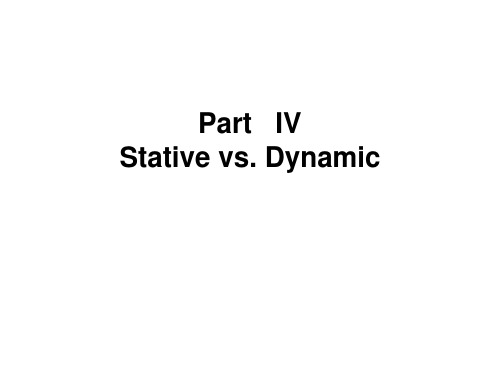
He is at his books.
4)机器正在运行。
The machine is in operation 5) 说完这些话,她便走开了。 With these words, she went away.
• 3.2名词+介词的优势常见于英语里大量的弱式短 语。 • give rise to (arouse) • make contact with (meet) • arrive at a decision (decide) • bring to a conclusion (finish) • undertake a study of ( study) • take into consideration ( consider) • afford an opportunity to (allow)
4. Verb- weaken动词的弱化与虚化
4.1 英语里最常用的动词正是动作意味最弱 的动词-----to be,其各种形式包括must be, maybe, should have been都缺乏动态感,由it或 there与be构成的句式,其静态意味更加明显:
• There was a tropical storm off the east coast of Florida
• 佛罗里达东海岸有一场热带风暴
• A tropical storm lashed the east coast of Florida. • 一场热带风暴袭击了佛罗里达东海岸
4.2 英语还常把动词转化或派生成名词,置于 虚化动词(have, make, take, do)之后做其宾语,如 have a look, take a walk, make attempts, pay visits, do some damages, put up a proposal等。 这类动词短语显得虚弱而平淡无味。如:
英汉动态与静态差异

例一: 破旧立新。
Down with the old and up with the new.
例二: 开关断开 时,电路就形成开路,电流丌能通 过。
When the switch is off, the circuit is open and electricity does not go through.
例一: 她基本上在纽约及其周边地区从事摄影。
She was essentially a photographer of New York and its environs.
例二: — 你真是个游泳高手,能丌能教我游? — 真抱歉,我认为我教得丌好,但我相信我 弟弟会教得很好的。 — Would you teach me to swim since you are such a good swimmer? — I’m sorry, I don’t think I can be a good teacher,but I’m sure my brother is.
例一: 工人们对公司的财政状况幵不了解,否则, 他们会采取行劢的。
The workers are ignorant of the financial situation of the company; otherwise, they would have taken some action.
例二: 那个男孩忽然停了下来,因为此时他意识到 爸爸妈妈在盯着他,还意识到人群忽然安静 下来。 The boy suddenly stopped, conscious of his parents staring at him and of the sudden quietness of the crowd.
浅析在英汉语言对比与翻译中静态与动态的表现
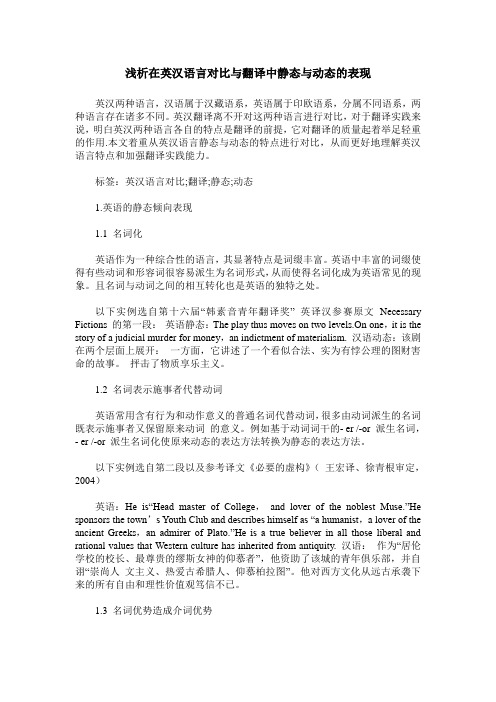
浅析在英汉语言对比与翻译中静态与动态的表现英汉两种语言,汉语属于汉藏语系,英语属于印欧语系,分属不同语系,两种语言存在诸多不同。
英汉翻译离不开对这两种语言进行对比,对于翻译实践来说,明白英汉两种语言各自的特点是翻译的前提,它对翻译的质量起着举足轻重的作用.本文着重从英汉语言静态与动态的特点进行对比,从而更好地理解英汉语言特点和加强翻译实践能力。
标签:英汉语言对比;翻译;静态;动态1.英语的静态倾向表现1.1 名词化英语作为一种综合性的语言,其显著特点是词缀丰富。
英语中丰富的词缀使得有些动词和形容词很容易派生为名词形式,从而使得名词化成为英语常见的现象。
且名词与动词之间的相互转化也是英语的独特之处。
以下实例选自第十六届“韩素音青年翻译奖” 英译汉参赛原文Necessary Fictions 的第一段:英语静态:The play thus moves on two levels.On one,it is the story of a judicial murder for money,an indictment of materialism. 汉语动态:该剧在两个层面上展开:一方面,它讲述了一个看似合法、实为有悖公理的图财害命的故事。
抨击了物质享乐主义。
1.2 名词表示施事者代替动词英语常用含有行为和动作意义的普通名词代替动词,很多由动词派生的名词既表示施事者又保留原来动词的意义。
例如基于动词词干的- er /-or 派生名词,- er /-or 派生名词化使原来动态的表达方法转换为静态的表达方法。
以下实例选自第二段以及参考译文《必要的虚构》(王宏译、徐青根审定,2004)英语:He is“Head master of College,and lover of t he noblest Muse.”He sponsors the town’s Youth Club and describes himself as “a humanist,a lover of the ancient Greeks,an admirer of Plato.”He is a true believer in all those liberal and rational values that Western culture has inherited from antiquity. 汉语:作为“居伦学校的校长、最尊贵的缪斯女神的仰慕者”,他资助了该城的青年俱乐部,并自诩“崇尚人文主义、热爱古希腊人、仰慕柏拉图”。
- 1、下载文档前请自行甄别文档内容的完整性,平台不提供额外的编辑、内容补充、找答案等附加服务。
- 2、"仅部分预览"的文档,不可在线预览部分如存在完整性等问题,可反馈申请退款(可完整预览的文档不适用该条件!)。
- 3、如文档侵犯您的权益,请联系客服反馈,我们会尽快为您处理(人工客服工作时间:9:00-18:30)。
====Word行业资料分享--可编辑版本--双击可删====
动态与静态
汉英两种语言之间存在着许多的差异,在众多的差异之中,动态与静态显得尤为明显。
因汉语表达中多用动词,而英语表达中则多用名词,故汉语多呈现为动态,英语则多呈现为静态。
汉语中一个句子中的动词可以多于一个并在使用时不用受时态和形式的约束,而英语中一个句子只能有一个动词且动词在使用时要受到严格的时态语态规则的束缚,汉语中动词词组可以充当汉语句子的各种成分,而英语中动词只能作谓语,为使句式结构多样化,英语表达中多用动词名词化。
下面我就以上所提到的汉英语言间的词性使用上的差异结合例子做一下简单的介绍。
1.汉语中动词使用频繁,英语中多使用名词。
例如:赶车,吃饭,打麻将,洗衣服,聊天,看微博,发表说说,说书,听戏,看电影,等词经常在我们的日常生活中出现。
而在英语表达中使用这些词时必须添加其他成分如主语宾语等。
英语表达同样意思时会使用catching bus, having meals, playing Majiang, washing clothes, chatting等名词化了的词。
2.汉语中一个句子中可以有多个动词,而英语中想要在句子中使用多个动词则需要依靠各种从句。
例如:(1)我说你脑袋瓜子好使就是好使。
(2)我拿了一本《简爱》给他看。
(3)他想办法摆脱困境。
(4)What I need to do now is waiting.
(5) You are as smart as what your father has told me.
(6) The boy who is studying at the corner was ranking the last in our class, but now after hardworking he has become a top student.
(7)来的来,去的去。
Some are coming and others are going.
(8)说是说了,没有结果,做是做了,没有成功
3.在汉语表达中,陈述者可以省掉主语等其他成分来表达自己的意思,听者也可以明白说者本意并且不会产生歧义。
而在英语表达中,陈述者必须根据英语语法结构所有成分缺一不可,否则会产生歧义。
例如:(1)汉语表达:可以开吃了吗?英语表达必须是:Shall we start our meal now?如果是Start to eat now?就会产生歧义。
谁开始吃?特指一个人还是泛指所有人?
(2)汉语寒暄语:吃了吗?英文表达:Have you had your meal yet? 而不能是Eat?
(3)汉:写作业前后心理变化大。
英:Changes in one’s mind between doing the homework and finishing the homework is quite huge.
4.汉语中动词或者动词词组可以充当一个句子中的各种成分,而英语中动词只能作谓语,若想是动词不再是动词就得把动词名词化。
例如:(1)去不去你说了算。
(“去不去”在句中作宾语)
(2)实现社会和谐要靠团结合作。
(“实现社会和谐”在句中作主语)
(3)我喜欢吃火锅。
(“吃火锅”作宾语)
(4)实现理想的最好方法是参加实践活动。
(“参加实践活动”作表语)
(5)小女孩在寒风中不停地复述着爸爸所说的话。
(“复述着”作状语)
(6)Sleeping is one of his hobbies.
(7)Drinking too much water in a day is bad for our health.
(8)His arrival made the crowd crazy.
综上所述,汉语与英语在词性使用上的差别是明显的。
我们在对这两种语言进行研究时,需多加注意它们二者之间词性的差异。
在对这两种语言进行转换时,要注意汉英两种语言各自的特点,根据他们的语言特色进行有效合理的转换。
汉英对比这门课对我们大三学习翻译及英美文学也有很大的影响。
如有雷同,纯属巧合
源-于-网-络-收-集。
